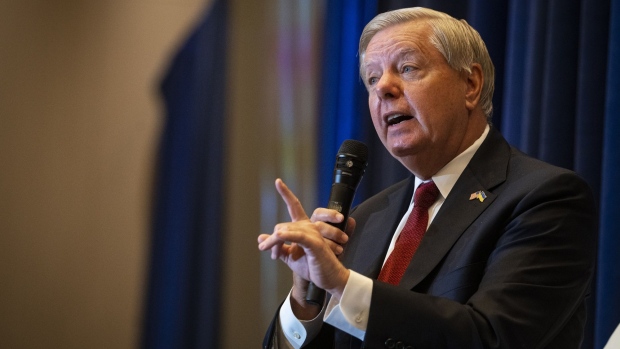Aug 15, 2022
Lindsey Graham Must Testify in Georgia Election Case, Judge Rules
, Bloomberg News

(Bloomberg) -- A federal judge ruled US Senator Lindsey Graham must testify before a state grand jury investigating whether any laws were broken by former President Donald Trump and his allies in attempts to overturn his 2020 election loss in Georgia.
US District Judge Leigh Martin May rejected Graham’s efforts to quash a subpoena Monday, finding that although members of Congress are generally shielded against being forced to testify about their legislative activities, the Fulton County grand jury was exploring post-election conduct that may fall beyond those protections.
May also rebuffed Graham’s arguments that he shouldn’t have to appear because of his status as a sitting senator -- that he was covered by sweeping sovereign immunity or, alternatively, a line of appeals court cases that set the bar high for forcing high-ranking officials to be deposed.
Graham’s office said he will appeal. Although the district court acknowledged that some of his activities may be protected, the judge “nevertheless ignored the constitutional text and binding Supreme Court precedent,” his office said in a statement.
The grand jury, convened by Fulton County District Attorney Fani Willis, is investigating Trump’s attempts to overturn the Georgia results of the 2020 presidential election.
Graham made two phone calls to Secretary of State Brad Raffensperger in the weeks following the election, according to the July 5 subpoena. At the time, Raffensperger said publicly that he believed Graham was urging him to find a way to throw out legitimately cast mail-in ballots. Graham has denied that.
Graham argued that the phone calls were “investigatory, information-gathering exercises” protected by the Constitution’s Speech or Debate Clause. Anything he learned could have “legislative” purposes related to election proposals in Congress or the role that lawmakers play in certifying the results. In addition, he said inquiries into how the state had managed the 2020 election fell under his jurisdiction on the Senate Judiciary Committee.
The judge wrote that Graham’s focus on the phone calls was misplaced. The grand jury was investigating a wider range of conduct relevant to Georgia’s 2020 elections that he could be questioned about, including “his public statements after the election, as well as conversations or interactions he had with the Trump Campaign or other third parties,” she said.
May left the door open for Graham to raise new legal challenges to specific areas of grand jury questioning, in sending the case back to Superior Court of Fulton County, which had issued the subpoena. She added that even if some constitutional protections applied to Graham’s potential testimony about the calls, it was possible that the grand jury could still ask some questions about those conversations.
“For example,” May wrote, “asking Senator Graham whether he directed the Georgia Secretary of State to take certain actions would be permissible and not violate the Speech or Debate Clause. That would be outside the information gathering that Senator Graham claims was legislative.”
As for Graham’s other challenges to the lawfulness of the subpoena, the judge wrote Willis had shown that “extraordinary circumstances” justified requiring Graham to show up notwithstanding his position in the Senate.
“Senator Graham’s potential testimony on these issues -- in addition to his knowledge about topics outside of the calls such as his alleged coordination with the Trump Campaign before and after the calls are unique to Senator Graham, and Senator Graham has not suggested that anyone else from his office can speak to these issues or has unique personal knowledge of them,” May wrote.
(Updates with Graham’s statement in fourth paragraph. An earlier version corrected the headline to identify the probe is in Georgia.)
©2022 Bloomberg L.P.






